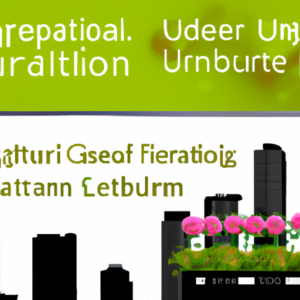
Imagine a world where farms are not sprawling fields in the countryside, but rather hidden gems nestled among the concrete jungle of urban cities. This is the rise of urban farming, where agriculture has taken a new form and hashtags play a significant role in its revolution. Through the power of these digital tags, cultivators are able to connect, learn, and share their experiences with ease, inspiring a new generation of urban farmers. In this article, we will explore how hashtags are transforming the landscape of agriculture, empowering individuals to grow their own food and create sustainable communities right in the heart of the city.

The Impact of Urban Farming
Urban farming is a growing trend that is having a significant impact on local communities and the agricultural industry as a whole. By bringing food production closer to urban areas, it has the potential to address various challenges related to food security, sustainability, and reducing the carbon footprint of the food system. In this article, we will delve into the different ways in which urban farming is making a positive impact, including reducing food miles, increasing food security, and promoting sustainable practices.
Reducing Food Miles
One of the major benefits of urban farming is its ability to significantly reduce food miles. Food miles refer to the distance that food items need to travel from the farm to the consumer. With traditional agriculture, food often needs to be transported long distances, increasing greenhouse gas emissions and contributing to air pollution. However, urban farming allows produce to be grown right in the heart of cities or in close proximity, minimizing transportation requirements. By reducing the distance food needs to travel, urban farming helps to decrease carbon emissions and lessen the environmental impact of the food system.
Increasing Food Security
Urban farming plays a crucial role in increasing food security by providing local communities with access to fresh and nutritious food. In many urban areas, access to quality produce is limited, particularly in low-income neighborhoods known as food deserts. These areas often lack grocery stores or farmers markets, making it difficult for residents to access fresh produce. Urban farming helps to address this issue by bringing food production directly into these communities. By growing food locally, urban farmers are able to supply fresh produce to those who need it most, contributing to the overall food security of the area.
Promoting Sustainable Practices
Another significant impact of urban farming is its ability to promote sustainable practices. With the growing concern over climate change and environmental degradation, it is important to find ways to reduce the ecological footprint of the agricultural industry. Urban farming does just that by utilizing empty lots, rooftops, and vertical spaces to cultivate crops. These practices minimize the need for large amounts of land and can even make use of recycled materials. Additionally, urban farmers often employ techniques such as composting, rainwater harvesting, and natural pest control methods, further reducing the reliance on chemical inputs. By promoting these sustainable practices, urban farming sets an example for the larger agricultural industry to follow.
The Rise of Urban Farming
Urban farming has been steadily gaining popularity in recent years, driven by a variety of factors such as increased interest in local and organic food, the desire for community engagement, and the need for more sustainable food systems. As this form of agriculture continues to grow, it is important to understand both the benefits and challenges associated with urban farming.
Benefits of Urban Farming
The benefits of urban farming are numerous and far-reaching. Not only does it provide access to fresh and locally grown produce, but it also helps to build stronger communities, promote healthier lifestyles, and create economic opportunities. Urban farming allows individuals to reconnect with their food and gain a better understanding of where it comes from. It brings people together, fostering a sense of community and improving social interactions. Moreover, by reducing the need for long-distance transportation, urban farming helps to minimize carbon emissions and promote a more sustainable food system.
Challenges of Urban Farming
While the benefits of urban farming are undeniable, there are also several challenges that need to be addressed. Limited space is often a major obstacle in urban areas, making it difficult to establish farms or gardens. Land scarcity, high property costs, and zoning regulations can pose significant barriers to urban farming initiatives. Additionally, the lack of accessible resources and technical knowledge can hinder the success of urban farming projects. However, with innovative solutions and community support, these challenges can be overcome, paving the way for the continued growth of urban farming.

The Role of Hashtags in Urban Farming
In today’s digital age, social media platforms and hashtags have become powerful tools for connecting people with shared interests and spreading information. Hashtags play a particularly important role in the world of urban farming, facilitating the building of communities, sharing knowledge and tips, and even marketing and selling produce.
Building Communities
Hashtags provide a simple yet effective way to connect like-minded individuals and build communities around urban farming. By using specific hashtags related to urban farming, individuals can easily find and engage with others who share a passion for sustainable food production in urban areas. This sense of community allows for the exchange of ideas, advice, and support, fostering a sense of belonging and empowerment among urban farmers.
Sharing Knowledge and Tips
Hashtags enable the sharing of knowledge and tips among urban farmers, leading to collaborative learning and improved farming techniques. By using hashtags such as #UrbanFarmingTips or #GrowYourOwn, individuals can share their experiences, successes, and challenges, allowing others to learn from their insights. This exchange of information not only benefits individual growers but also contributes to the collective knowledge and advancement of urban farming practices.
Marketing and Selling Produce
Hashtags have also become a valuable marketing tool for urban farmers looking to sell their produce directly to consumers. By using hashtags like #FarmersMarket or #LocalProduce, farmers can reach a wider audience and promote their products. Hashtags allow consumers to find information about where and how to purchase locally grown produce, encouraging socially responsible consumption. Additionally, by showcasing their products online, urban farmers can create a brand identity and attract customers who value locally sourced, sustainable food.
How Hashtags are Revolutionizing Agriculture
The use of hashtags in urban farming is not just limited to building communities and sharing knowledge. They have the power to revolutionize the entire agricultural industry by breaking barriers, spreading awareness and education, and facilitating market access.
Breaking Barriers and Enabling Collaboration
Hashtags in urban farming have the unique ability to break geographical barriers and enable collaboration between farmers across regions. By using hashtags like #UrbanFarmingNetwork or #FarmersCollaborate, farmers can connect with others outside of their immediate area, sharing expertise, resources, and innovative ideas. This collaboration allows for the exchange of best practices, overcoming challenges, and finding solutions together. Hashtags provide a platform for farmers to collaborate, regardless of distance, fostering a sense of unity within the agricultural community.
Spreading Awareness and Education
Hashtags have become a powerful tool for spreading awareness and education about the importance and benefits of urban farming. By using hashtags such as #SustainableAgriculture or #FoodSecurity, individuals and organizations can share success stories, informative articles, and resources related to urban farming. This widespread sharing of information helps to educate the public about the positive impacts of urban farming and encourages more people to get involved. Through the use of hashtags, urban farming becomes a topic of discussion and raises awareness of the need for sustainable food systems.
Facilitating Market Access
Hashtags play a crucial role in facilitating market access for urban farmers. By using hashtags like #LocalProduce or #FarmersMarket, farmers can connect directly with consumers who are actively seeking locally grown, sustainable produce. Marketplaces and platforms dedicated to connecting farmers with consumers often use hashtags to categorize and organize their offerings. This allows consumers to easily find and support local farmers, contributing to the growth of the urban farming movement and promoting the consumption of fresh, sustainable produce.

Building Communities
One of the key benefits of hashtags in urban farming is their ability to bring together like-minded individuals and create a sense of community. By using specific hashtags related to urban farming, individuals can connect with others who share similar interests and goals. This sense of community is invaluable for urban farmers, as it provides a support network, inspiration, and empowerment.
Connecting Like-Minded Individuals
Hashtags in urban farming act as a virtual gathering place where individuals can connect with others who share their passion for sustainable food production. By using hashtags such as #UrbanFarmersCommunity or #GrowTogether, individuals can join conversations, share experiences, and network with fellow urban farmers. This connection with like-minded individuals not only provides support but also fosters a sense of camaraderie and motivation to continue their urban farming endeavors.
Creating Support Networks
The use of hashtags allows urban farmers to create support networks that can help them overcome challenges and share valuable insights. By using hashtags like #UrbanFarmingSupport or #AskTheFarmers, individuals can reach out to the community for advice, troubleshoot problems, or seek guidance. This support network provides a space for farmers to exchange ideas, learn from one another, and find solutions to common issues. Through these collaborations, urban farmers can navigate the complexities of farming in urban environments more effectively.
Inspiring and Empowering Farmers
Hashtags in urban farming also serve as a source of inspiration and empowerment for farmers. By following hashtags such as #UrbanFarmingInspiration or #FarmersMotivation, individuals can find stories of success, innovative farming methods, or simply words of encouragement. This constant source of inspiration keeps urban farmers motivated and reminds them of the positive impact they are making in their communities. Hashtags provide a platform for urban farmers to share their journey and inspire others to join the movement.
Sharing Knowledge and Tips
Hashtags in urban farming are a powerful tool for collaborative learning and sharing knowledge. By using specific hashtags related to farming techniques, resources, or troubleshooting, individuals can tap into a wealth of information and expertise from the farming community.
Collaborative Learning
Hashtags enable the collective learning experience for urban farmers by allowing them to share their experiences, techniques, and insights. By using hashtags like #FarmingTips or #UrbanFarming101, individuals can share their knowledge and offer advice to others who may be starting their own urban farming journey. This collaborative learning fosters a community of continuous learning and improvement, benefiting both experienced and novice urban farmers.
Troubleshooting and Problem-solving
The use of hashtags in urban farming provides a platform for farmers to troubleshoot problems and find solutions. By utilizing hashtags such as #FarmingProblems or #AskTheExperts, individuals can seek advice or get input from the community when faced with challenges. This collective problem-solving approach allows farmers to tap into the diverse perspectives and experiences of others, increasing the likelihood of finding effective solutions. Through the power of hashtags, urban farmers have a community of support at their fingertips.
Improved Farming Techniques
Hashtags in urban farming also contribute to the improvement of farming techniques by sharing innovative methods and practices. By following hashtags like #SustainableFarming or #InnovativeFarming, individuals can stay up to date with the latest advancements in urban farming. This exchange of ideas and information helps urban farmers adopt more efficient and sustainable techniques, leading to improved yields, reduced resource consumption, and enhanced overall productivity. With hashtags, urban farmers can continuously improve their practices and contribute to the growth of the urban farming movement.
Marketing and Selling Produce
Hashtags not only play a role in building communities and sharing knowledge but also in marketing and selling produce for urban farmers. By utilizing specific hashtags related to their products or target market, farmers can increase their visibility, create a brand identity, and promote socially responsible consumption.
Direct-to-Consumer Sales
Hashtags offer urban farmers a direct route to reach their target market by connecting them with consumers seeking local and sustainable produce. By using hashtags like #FarmToTable or #ShopLocal, farmers can highlight their products and attract customers who value fresh, locally grown food. This direct-to-consumer approach cuts out intermediaries, allowing farmers to build a personal connection with their customers and establish a loyal customer base. Hashtags enable farmers to market and sell their produce in a way that aligns with their values and resonates with conscious consumers.
Creating a Brand Identity
The use of hashtags in urban farming allows farmers to create a brand identity that sets them apart from the competition. By using consistent and unique hashtags, farmers can reinforce their values, mission, and quality of their products. This branding helps to establish trust and loyalty among customers, who can easily recognize and support the farmers they resonate with. Hashtags become a powerful marketing tool that consolidates the brand identity of urban farmers and allows them to stand out in a crowded marketplace.
Promoting Socially Responsible Consumption
Hashtags in urban farming also aid in promoting socially responsible consumption by connecting consumers with sustainable alternatives. By using hashtags like #EatLocal or #SupportFarmers, farmers can reach consumers who prioritize supporting local farmers and reducing their carbon footprint. These hashtags act as a call to action, urging consumers to choose locally sourced produce over conventional options. By promoting socially responsible consumption, hashtags contribute to the growth of the urban farming movement and encourage a shift towards a more sustainable food system.
Breaking Barriers and Enabling Collaboration
Hashtags in urban farming have the potential to break down barriers that traditionally limit collaboration between farmers. By using specific hashtags, farmers can connect with others outside of their immediate region, sharing their expertise, resources, and innovative ideas.
Cross-Regional Collaboration
Hashtags enable farmers to collaborate across regions, breaking down geographical barriers. By using hashtags like #UrbanFarmingNetwork or #FarmersCollaborate, farmers have a platform to connect with others who share a passion for sustainable food production. This collaboration allows for the exchange of knowledge, experiences, and best practices, even when farmers are in different parts of the world. By breaking down regional barriers, hashtags foster a sense of unity within the agricultural community and promote a global perspective on urban farming.
Expertise and Resource Sharing
Hashtags facilitate the sharing of expertise, resources, and innovative ideas across different farming communities. By using specific hashtags related to farming techniques or resources, farmers can connect with others who have specialized knowledge or access to specific resources. This expertise and resource sharing allows farmers to learn from one another, benefit from different perspectives, and ultimately improve their farming practices. Hashtags empower farmers to tap into a vast network of knowledge that was previously inaccessible, leading to more efficient and sustainable urban farming.
Overcoming Language and Cultural Differences
Hashtags in urban farming can help overcome language and cultural differences that may inhibit collaboration between farmers. By using popular hashtags related to urban farming in different languages or cultural contexts, farmers can connect with one another and bridge the gaps created by language or cultural barriers. The use of hashtags allows for shared experiences and discussions related to urban farming, regardless of language or cultural background. By facilitating communication and understanding, hashtags contribute to a more inclusive and diverse urban farming community.
Spreading Awareness and Education
Hashtags in urban farming are a powerful tool for spreading awareness and education about the importance and benefits of sustainable food production in urban areas. By using specific hashtags, individuals and organizations can share success stories, informative articles, and resources related to urban farming.
Highlighting Urban Farming Success Stories
Hashtags allow for the highlighting of urban farming success stories, serving as a source of inspiration and motivation for others. By using hashtags like #UrbanFarmingSuccess or #FromEmptyLotToFoodParadise, individuals can share their achievements and showcase the positive impact of urban farming in their communities. These success stories generate awareness and demonstrate the potential of urban farming to transform landscapes, improve food access, and create sustainable food systems. Through the power of hashtags, urban farming becomes not only a practical solution but also a source of inspiration and hope.
Educational Campaigns and Resources
Hashtags in urban farming also facilitate the dissemination of educational campaigns and resources. By leveraging hashtags like #SustainableAgriculture or #FoodSecurity, individuals and organizations can share informative articles, videos, and other resources related to urban farming. This educational content helps to raise awareness about the benefits of urban farming, as well as the challenges and solutions associated with it. Through the use of hashtags, individuals can access valuable information, learn about new techniques, and educate themselves about the importance of sustainable food production.
Encouraging Youth Participation
Hashtags in urban farming play a crucial role in encouraging youth participation and engagement in sustainable agriculture. By using hashtags like #YouthInAgriculture or #FutureFarmers, individuals and organizations can connect with the younger generation, inspiring them to get involved in urban farming. Through social media platforms and hashtags, young people can learn about the opportunities and benefits of urban farming, empowering them to become agents of change in their communities. Hashtags break down generational barriers and provide a space for youth to share their ideas, passions, and initiatives related to urban farming.
Facilitating Market Access
Hashtags in urban farming are an essential tool for connecting farmers directly with consumers, facilitating market access for locally grown produce. By using specific hashtags, farmers can reach a wider audience and promote the consumption of local and sustainable produce.
Connecting Farmers with Consumers
Hashtags provide a direct link between farmers and consumers seeking locally grown, sustainable produce. By using hashtags like #LocalProduce or #FarmersMarket, farmers can connect with a community of consumers who actively search for these products. This direct connection fosters transparency and trust, as consumers have the ability to learn more about the farmer, their farming practices, and the origin of the produce. Farmers can use hashtags to showcase their products, educate consumers, and build long-lasting relationships with their customers.
Marketplace Platforms
Hashtags are often utilized by marketplace platforms dedicated to connecting farmers with consumers. By using specific hashtags related to their platform, farmers can increase their visibility to consumers actively looking to purchase local produce. These marketplace platforms often categorize and organize their offerings using hashtags, making it easier for consumers to find and support local farmers. Hashtags become a crucial element in the success of marketplace platforms, enabling farmers to access a wider audience and expand their market reach.
Promoting Local and Sustainable Produce
Hashtags in urban farming contribute significantly to the promotion of local and sustainable produce. By using hashtags like #ShopLocal or #SustainableFarming, farmers can raise awareness about the value of supporting local agriculture and reducing the carbon footprint of the food system. These hashtags act as a call to action, urging consumers to make conscious choices when purchasing produce. By promoting locally grown, sustainable produce, hashtags play a vital role in shaping consumer behavior and driving demand for more environmentally friendly food options.
In conclusion, hashtags have revolutionized the world of urban farming by facilitating communication, sharing knowledge, and promoting sustainable agriculture. They have played a crucial role in building communities of like-minded individuals, connecting urban farmers across regions, and inspiring collaboration. Hashtags have also been instrumental in spreading awareness and education about the benefits of urban farming, encouraging youth participation, and facilitating market access for locally grown produce. As the urban farming movement continues to grow, hashtags will continue to be a powerful tool in the quest for a more sustainable and resilient food system.






